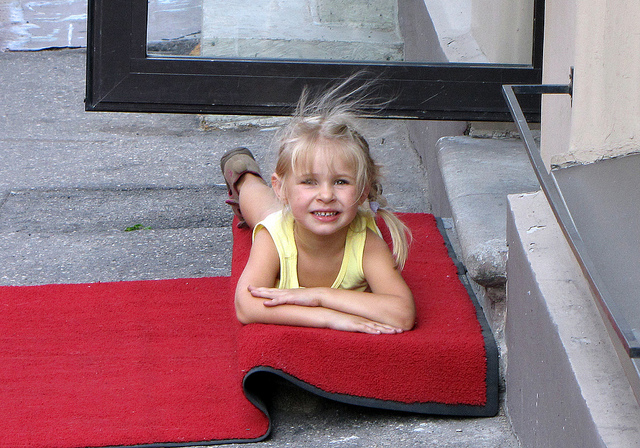This piece was originally published over at Moms Clean Air Force [2].
Air pollution is now the world’s largest single environmental health risk according to new estimates [3] released by WHO, showing that in 2012 around 7 million people died — one in eight [4] of total global deaths — as a result of air pollution. 4.3 million of those deaths were attributable to indoor air pollution.
New carpet installation is one cause of indoor air pollution and can fill household air with volatile organic compounds (VOCs), including probable carcinogens like formaldehyde and benzene and stain repellents.
My struggle to find a chemical-free carpet [5] began in college, but it didn’t end there. Every space that I’ve come to call home over the years has had some form of carpeting.
The toxic carpet issue became real as I watched my first child begin to roll and fall face first into our plush, new carpet. Most conventional carpets are made from synthetic fibers doused in artificial dyes, stain repellents, adhesives and other toxic chemicals. And my son was diving head first into that toxic soup.
What can we do?
BECOME A CARPET DETECTIVE!
As with any purchase, it’s important to be an informed consumer. We can all become carpet detectives! Contact retailers directly to ask questions and verify that you’re receiving a product free from toxic chemicals. Not only will this ensure that your carpet is safe for you and your family, but it will also notify retailers that we, as consumers, care about our products and we refuse to purchase products that are toxic.
Wondering where to buy a chemical free carpet? I detected a few brands that fit the bill. Some better than others. Some more expensive than others.
Earth Weave
Earth Weave [6] is my top choice for chemical free carpets. According to James Stinnett, President of Earth Weave Carpet Mills:
“The company’s commitment lies not in the recycling petrochemical products, but rather in taking advantage of the ultimate manufacturer; Mother Nature and her renewable natural resources. There’s no safe level of toxicity”
He also refers to the “recycled pop bottle products” that other manufacturers are using as an eco-selling point, and calls this “green-washing” stating that even though these products are marketed as environmentally friendly, they’re truly not.
Earth Weave uses something called Bio-Floor, which is 100% bio-degradable, and will decompose in a similar fashion to trees and grass clippings. Their products are made of pure wool, with no dyes, pesticides or stain protections.
Bloomsburg Carpet
Bloomsburg Carpet [7] is a family owned business that focuses on using sustainable fibers that are ecologically friendly and readily renewable. According to the company “Our carpets meet the highest standard of indoor air quality and meet or exceed the Green Label Plus* criteria for floor coverings.” Green Label Plus [8] is an independent testing program that identifies carpet with very low emissions of VOCs to help improve indoor air quality.
Woolshire
Woolshire is a family owned business, using wool to make their carpets. Wool acts as a natural fire retardant and also is a non-allergenic fiber which does not promote the growth of bacteria, dust mites, or give off harmful emissions. All Woolshire carpets are certified Green Label Plus* (see above for description). They’ve also partnered with EnviroCel, a natural backing for their carpets made from recycled soda bottles and soy beans.
Helios
Helios [9] carpets are made in the US and are owned by Mohawk [10], a large conventional carpet distributor. Helios carpets are primarily made from New Zealand wool. Wool is dirt and soil resistant, fire retardant and non-allergenic. While most carpeting is tufted, Helios Wool carpets are woven. This makes them wear twice as long, and the company claims this reduces energy consumption by 50% during manufacturing and keeps them out of landfills for a many more years.
*Note about Green Label Plus certification: Some carpet manufacturers argue that the Green Label Plus certification isn’t a very stringent or reliable standard.
Don’t you think it’s time to take the burden away from the consumer and place it where it belongs – with the carpet industry?
Have you had any luck finding non-toxic, chemical-free carpets?
